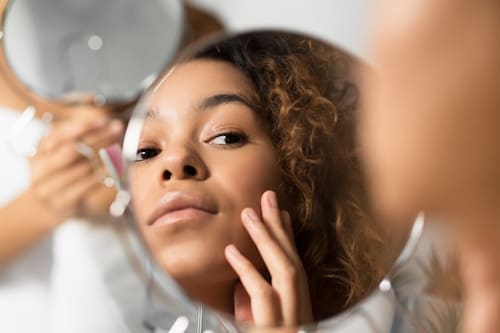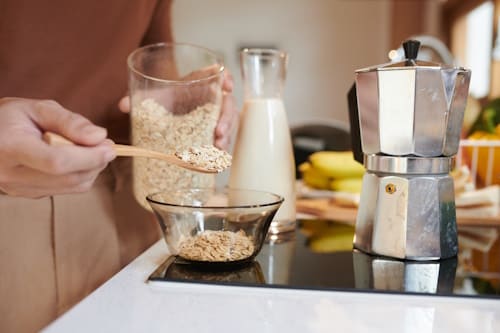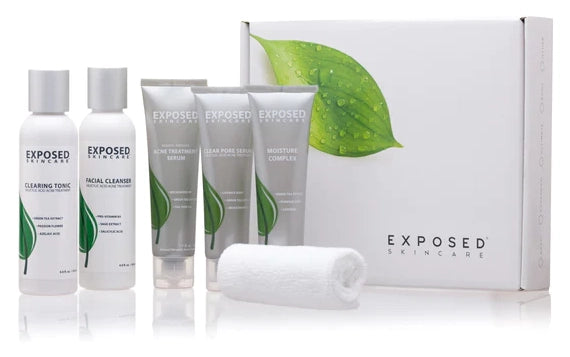One skin condition that has gained significant attention recently is fungal acne. Though its name may sound daunting, understanding it and finding the best moisturizer for fungal acne is essential for those tackling it.
If you're on a fungal acne journey, explore some of the best fungal acne-safe remedies that can pave the way for clear skin in 2023 and beyond.
Also read: How to choose the best acne treatment
Biggest Take-Aways:
- Understanding fungal acne's distinct causes and symptoms is crucial for effective treatment.
- Natural home remedies, including aloe vera, coconut oil, and oatmeal, can relieve and manage fungal acne.
- Choosing the right skincare products, especially moisturizers, is essential in maintaining a healthy skin barrier and preventing fungal acne breakouts.
- Exposed Skin Care offers specialized solutions that address acne symptoms and its root causes, ensuring a holistic skincare approach.

Understanding Fungal Acne
Before diving into the best fungal acne-safe moisturizer, it's essential to grasp what fungal acne is. Unlike bacterial acne, which results from bacteria (acne vulgaris) blocking hair follicles, fungal acne comes from an overgrowth of yeast on the skin.
This skin condition doesn't manifest in the same way regular acne does. Instead of the typical pimples associated with bacterial acne, fungal acne triggers tiny, itchy bumps primarily found on the chest, back, and face.
Understanding the differences between these types of acne is crucial when treating fungal acne effectively.
The Role of Moisturizers in Skincare
The skin barrier is the outermost layer of our skin, which acts as a protective barrier on the skin, shielding it from external irritants and holding in moisture. A compromised skin barrier can lead to dehydrated skin and exacerbate fungal acne.
The right face moisturizer will help maintain a healthy skin barrier, keeping the skin hydrated and protected. Moreover, when dealing with fungal acne, it’s best to ensure that the moisturizer is a fungal acne-safe product.
Five Natural Home Remedies for Fungal Acne in 2023
The call for natural solutions in skincare is resonating with many more than ever. Here are five fungal acne-safe moisturizers, ideal for various skin types, which can become a pivotal part of your skincare routine.
1. Aloe Vera Gel
Known for its soothing and anti-inflammatory properties, aloe vera gel moisturizer is an excellent choice for those with sensitive skin types.
-
Why it works: Aloe doesn't just soothe irritated skin; its natural composition helps with acne, reducing inflammation and brightening the skin.
-
How to use: Simply extract the gel from an aloe leaf and massage it into the skin. You can mix it with a drop or two of hyaluronic acid for added hydration.

2. Coconut Oil and Turmeric
Hello fab coconut water cream lovers, here's another way to enjoy coconut in your skincare routine! Coconut oil, combined with turmeric's antibacterial and antifungal properties, can be a powerhouse for treating fungal acne.
-
Why it works: While some may think that oils might exacerbate fungal acne, coconut oil has antifungal properties, which can help reduce fungal growth on the skin.
-
How to use: Mix a tablespoon of coconut oil with a pinch of turmeric. Apply to the affected area and leave on for 15 minutes before washing off.
3. Oatmeal
Suitable for all skin types, especially sensitive skin prone to irritation, oatmeal can relieve the skin from itching and inflammation.
-
Why it works: Oatmeal acts as a moisturizing lotion, helping to keep the skin barrier function intact and reducing irritation.
-
How to use: Create a paste by mixing ground oatmeal with water. Apply to the face, and after 10 minutes, gently rinse off.

4. Honey
Nature's sweet elixir, honey, isn’t just for teas and toast. In skincare products, honey stands out as a fungal acne-safe moisturizer.
-
Why it works: Honey possesses antifungal properties, effectively treating various skin conditions, including fungal infections.
-
How to use: Apply raw honey on the affected area, let it sit for about 20 minutes, and then rinse off.
5. Green Tea
This beverage staple goes beyond being a morning wake-up call. When used topically, green tea can be a boon for skin care, particularly for those with acne-prone skin.
-
Why it works: Green tea contains antioxidants that help reduce acne lesions on the skin, making it a great fungal acne treatment.
-
How to use: Brew a strong cup of green tea, let it cool, then apply it to the skin using a clean cloth.
The Benefits of Using Exposed Skin Care for Acne Management
The battle against acne can often be daunting, but with Exposed Skin Care, the journey becomes a lot more manageable.
Here's why Exposed Skin Care stands out:
- Versatility: Exposed Skin Care has products tailored for all skin types.
- Urea Moisturizer: It offers an effective moisturizer that benefits various skin types, especially dry ones.
- Safe for Fungal Acne: While fungal acne doesn't respond to traditional acne treatments, Exposed Skin Care offers a fungal acne skincare routine that's fungal-safe. Say goodbye to concerns about causing fungal overgrowth.
- Brighter Complexion: The products work best not just for acne but also in the evening out skin tone, leaving the skin radiant.
- Intensive Hydration: Their intensive moisture facial cream ensures skin stays hydrated without leaving an oily residue.
- Comprehensive Approach: It goes beyond just treatment products. Every aspect of acne care is considered, from addressing the known fungal causes of acne to ensuring makeup products don't exacerbate symptoms.
Embrace a clearer future, free from dead skin cells and acne, with Exposed Skin Care's comprehensive range.
Conclusion
Navigating the world of fungal acne can be intricate, especially when differentiating it from other forms of acne due to its unique causes. The overgrowth of yeast, which leads to fungal acne, requires a distinctive treatment strategy.
Fortunately, there are a plethora of products to help manage and alleviate the symptoms of this particular skin ailment. One would think combating acne would be straightforward, but the myriad of causes, from bacterial to fungal, necessitates specialized care.
A holistic approach that treats the skin while protecting its natural barrier becomes paramount. The goal is to cater to the skin without leaving it vulnerable to further breakouts or complications.
Keeping the skin's well-being in mind and understanding the fungal acne symptoms and their underlying causes can pave the way for effective treatment. Exposed Skin Care offers a tailored solution that addresses the symptoms and root causes of fungal acne, ensuring a comprehensive skincare approach.
FAQs
What is fungal acne, and how does it differ from bacterial acne?
Fungal acne results from an overgrowth of yeast on the skin, leading to small, itchy bumps. In contrast, bacterial acne arises from bacteria blocking hair follicles, resulting in typical pimples.
Why are moisturizers essential for treating fungal acne?
Moisturizers help maintain a healthy skin barrier, ensuring the skin stays hydrated and protected from external irritants, which can exacerbate fungal acne.
Can natural remedies be effective in treating fungal acne?
Yes, natural remedies like aloe vera gel, coconut oil with turmeric, oatmeal, honey, and green tea have properties that can help treat and manage fungal acne.
What ingredients should be avoided when dealing with fungal acne?
It's essential to avoid products that exacerbate fungal acne symptoms or lead to fungal overgrowth. Some oils or heavy creams might not be suitable.
How does Exposed Skin Care help in managing acne?
Exposed Skin Care offers tailored products that address both bacterial and fungal acne causes, ensuring comprehensive skincare that considers the skin's overall well-being.



















